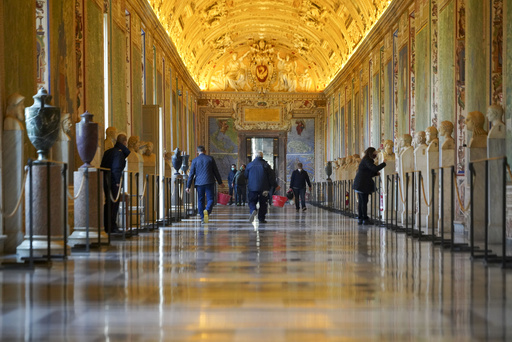ROME (AP) — Forty-nine employees of the Vatican Museums have filed a class-action complaint with the Vatican administration demanding better seniority, leave and overtime benefits in an unusual, public challenge to Pope Francis’ governance.
The complaint, dated April 23 and made public this weekend in Italian newspapers, also alleged that staff faced health and security risks due to cost-saving and apparent profit-generating initiatives at the museum, including overcrowding and reduced security guards to keep tourists at bay.
Neither the Vatican spokesman nor Cardinal Fernando Vérgez Alzaga, the president of the Vatican City State administration which controls the museums, responded to an email seeking comment.
The complaint is the latest legal challenge to underscore how the Vatican’s laws, regulations and practices are often incompatible with Italian and European norms. Recently, civil and criminal cases have exposed how Vatican employees, especially lay Italian citizens, have little or no legal recourse beyond the peculiar justice system of the city state, an absolute monarchy where Francis wields supreme executive, legislative and judicial power.
In the class-action complaint, written and signed by veteran Vatican attorney Laura Sgro on behalf of the 49 employees, museum staffers cited the social teaching of the Catholic Church and Francis’ own appeals for employers to respect the dignity of workers in demanding better treatment.
Among other things, they demanded better transparency about how employees are able to advance, a restoration of seniority bonuses and insisted the Vatican follow Italian norms on sick days. Employees currently have to stay home all day, rather than a few hours, to await a potential visit to check that they aren’t merely taking the day off, the complaint said.
Under the Vatican’s labor regulations, Verzaga has 30 days to respond to the complaint. If no talks begin, Sgro can take the claims to the Vatican’s labor office to attempt a negotiated reconciliation, which could end up in the tribunal. However, the office can refuse to hear the case and, according to lawyers, often does, leaving the employees with no further recourse.
In recent cases before the Vatican tribunal, lawyers have signaled they may try to bring employees’ complaints about the system to the European Court of Human Rights. The Holy See isn’t a member of the court or a signatory to the European Convention on Human Rights. But some lawyers say the Vatican nevertheless committed to upholding European human rights norms when it signed onto the European Union monetary convention in 2009.
The Vatican Museums are one of the primary sources of revenue for the Vatican, subsidizing the Holy See bureaucracy, which acts as the central government for the Catholic Church. The museums, which suffered a big financial hit from COVID-19 closures and restrictions, increased the cost of a full-price ticket at the start of the year to 20 euros ($21.50), up from 17 euros.
This website uses cookies so that we can provide you with the best user experience possible. Cookie information is stored in your browser and performs functions such as recognising you when you return to our website and helping our team to understand which sections of the website you find most interesting and useful.
